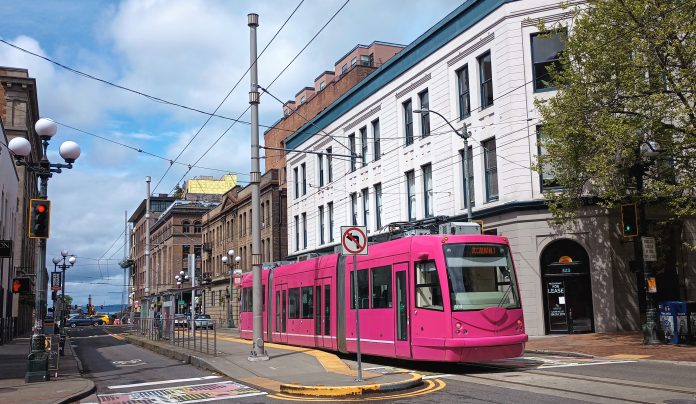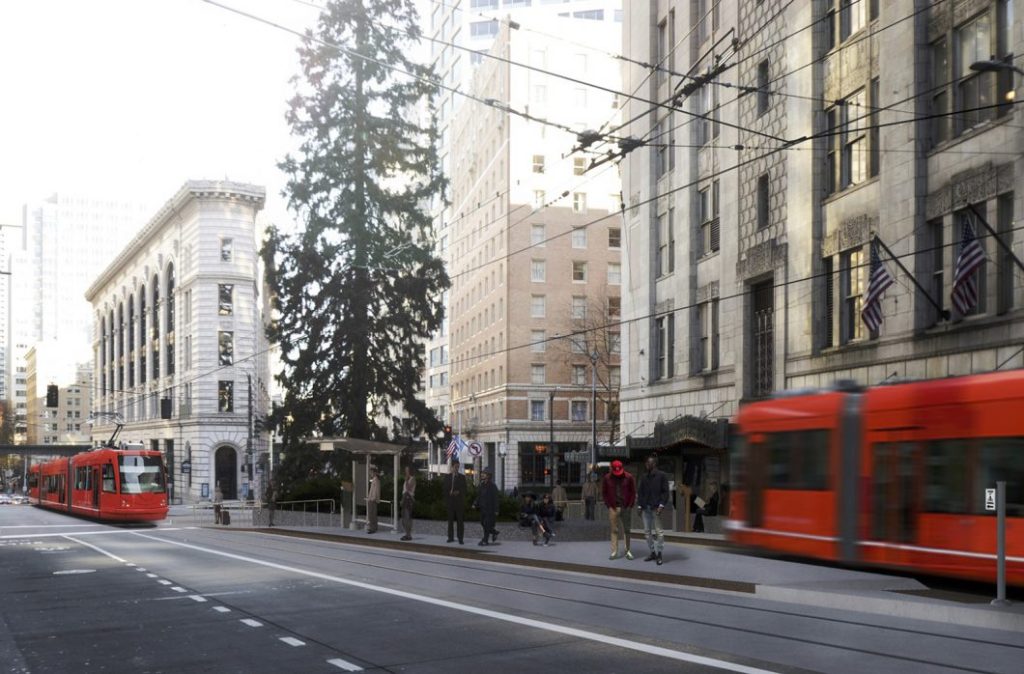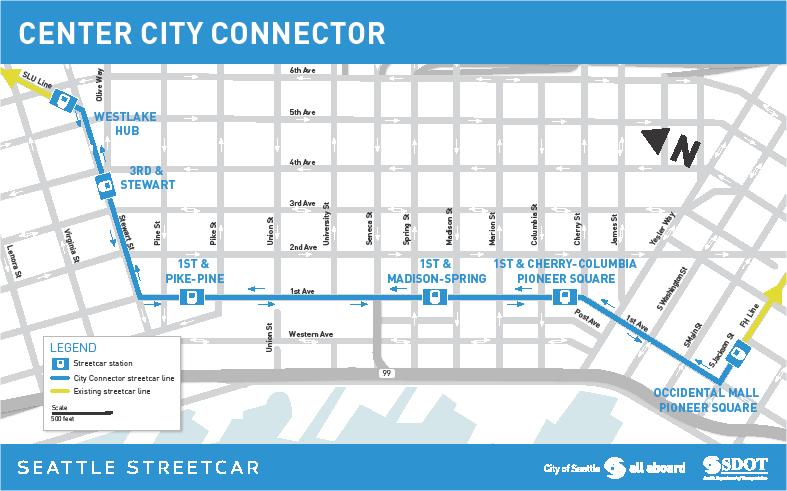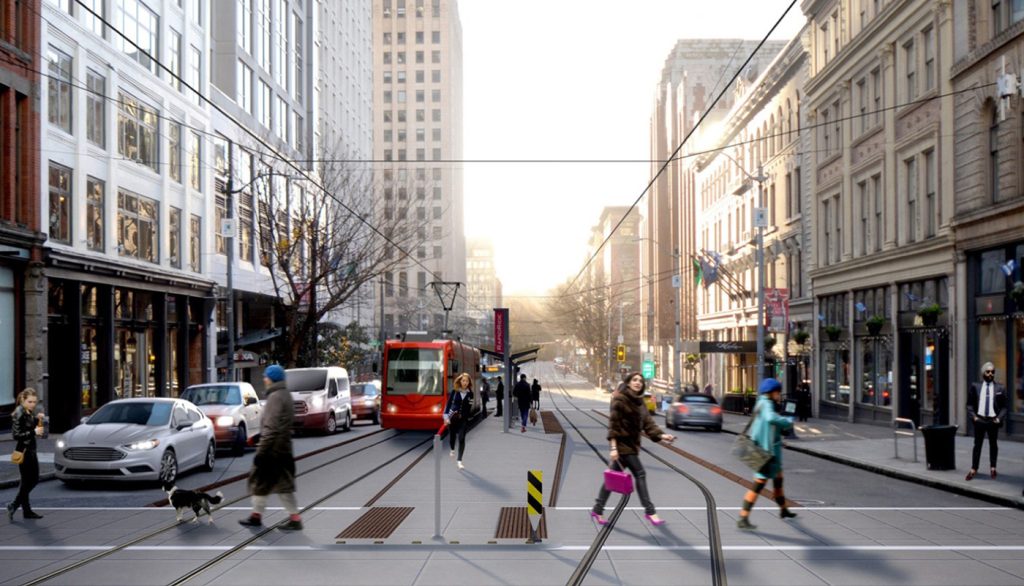
Seattle’s long-planned but much-delayed attempt to connect its two existing streetcar lines via a downtown extension along First Avenue is once again in trouble. This week, a City Council committee voted three to two to divert funding earmarked to get the project, dubbed the Center City Connector, back on track.
The midyear budget amendment, proposed by Councilmembers Alex Pedersen and Lisa Herbold — both longtime opponents of the streetcar project — will pull back just over $1 million in funding, which was proposed by Mayor Bruce Harrell to go toward updating the streetcar project’s feasibility study and getting updated cost estimates. Most of that funding, $805,000, is set to come from the city’s dedicated sales tax funding transit service and other transit-related projects, with the rest coming from the city’s general fund. An initial version of the amendment would have directed that funding to go toward Vision Zero projects instead, but the one approved Wednesday simply disconnects the funding from the streetcar project.
In pulling the money, several councilmembers framed the decision to move forward on the project as one that should be left to a future city council, while at the same time weighing in on the policy question about whether the streetcar is worthy of funding.
“In my view, the Center City Connector is expensive, redundant, disruptive, and less important than many other transportation projects we have, especially transportation safety projects,” Pedersen said as an explanation of why he co-sponsored the amendment.

In development for well over a decade, the idea of connecting the South Lake Union and First Hill Streetcar lines has received a renewed push under Mayor Bruce Harrell as one aspect of his Downtown Activation Plan, with the concept of a “Culture Connector” providing an easy way to get between central Downtown, Pioneer Square, and the International District. This proved appealing to the Mayor’s Office. SDOT Director Greg Spotts has embraced the concept, posting photos of numerous walking tours conducted with city staff along the proposed route since taking the helm at the department last fall.
“The Culture Connector is all about hop-on hop-off access to a variety of Seattle-flavor restaurants, stores and entertainment venues. Its [return on investment] will be measured in jobs and vitality and sales tax revenues rather than simply connecting the two existing lines,” Spotts tweeted in December.

Councilmember Lisa Herbold, who in past years has taken to calling the streetcar project the “shopping shuttle,” didn’t seem interested in updating the project’s core assumptions at all.
“It’s important that we recognize that this project has been on hold,” Herbold said. “There is no plan for construction of the streetcar…the only viable source for construction funding would be dipping into the Move [Seattle] levy renewal next year, which I believe will hinder the ability to fund safety and maintenance projects and perhaps it would threaten voter approval.”
Voting to oppose Pedersen and Herbold’s amendment was Councilmember Andrew Lewis, in whose district the streetcar would be built. “I don’t interpret this funding in the budget as necessarily being a signal one way or another on whether the project as a whole will be green lit,” he said.
Lewis framed the budget allocation as necessary to get all of the information needed to make a clear-eyed policy decision about the merits of the project and potential funding sources. Lewis was joined in his no vote by Finance Committee Chair Teresa Mosqueda.
“We’ve long tried to fund, and I’ve long supported, efforts to update our 2019 feasibility study which is a requirement of potentially accessing all of this federal money,” Lewis told The Urbanist, “and I think one of the things that’s appealing about the Cultural Connector is the fact that it could be competitive for being a largely federally-funded project, and hold the Seattle taxpayer largely harmless.”
In recent years, SDOT has declined to go after some of the biggest sources of federal funding coming from the Biden administration, most notably declining to go after the lucrative RAISE grant for two years in a row. The Center City Connector is one project that the City could demonstrate is shovel ready — if the documentation for the project can be brought up to date.

Councilmember Sara Nelson, supporting the amendment, cited concerns she’s hearing from downtown business owners about the potential disruption of First Avenue for up to three years of streetcar construction. While that may be, the larger business community has generally been supportive. The Downtown Seattle Association, which represents 700 downtown businesses and nonprofits, lists the project as one of their transportation priorities.
This week, the Pike Place Market Constituency, a group that advises Pike Place’s development authority and acts as a voice for the general public in Market governance, voted to send a letter to the council opposing the project and supporting shuttle bus service to the Market instead. Pike Place business owners have long opposed losing loading spaces along the First Avenue side of the Market as part of the streetcar project’s design.
Nelson also suggested it was time for another group of city policymakers to weigh in on the project.
“We’ve got a new mayor, and more councilmembers coming that could have different opinions about this project going forward,” Nelson said.
If this amendment is ultimately approved by the full city council, this will likely punt the question of whether to allocate funding for this to later this fall, and not to the new city council taking office in January.
Setbacks to the Center City Connector are nothing new, but by holding back this seed funding, the likelihood of getting the project back on track remains low.
Ryan Packer has been writing for The Urbanist since 2015, and currently reports full-time as Contributing Editor. Their beats are transportation, land use, public space, traffic safety, and obscure community meetings. Packer has also reported for other regional outlets including Capitol Hill Seattle, BikePortland, Seattle Met, and PubliCola. They live in the Capitol Hill neighborhood of Seattle.


